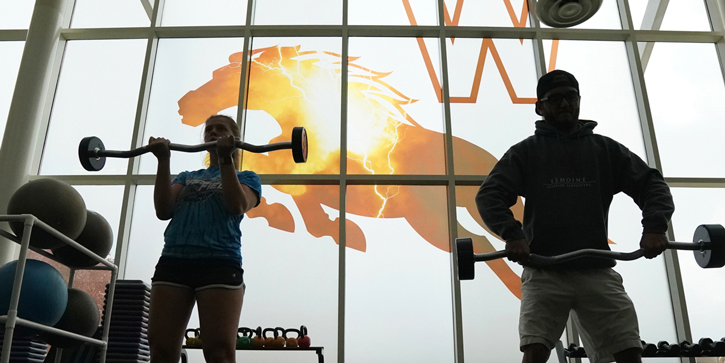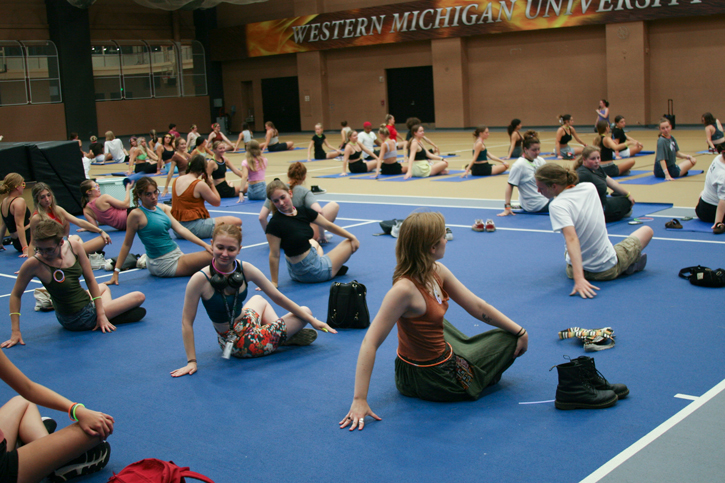Last fall, the American Psychological Association found more than 60% of college students met the criteria for at least one mental health problem. As such, campus rec departments at schools like Purdue University and Western Michigan University (WMU) are striving to implement efficient mental health initiatives.
Amy Seth, the director of University Recreation at WMU, said the top issues students on her campus are facing pertain to sleep issues, school stress and anxiety around doing research.
“They go into a spiral when school becomes difficult,” said Seth. “They are looking for work on campus, which tells me finances are very important. Also, they are searching for clubs and organizations as they try to build connections.”
Will Evans, the senior assistant director of Wellness at Purdue RecWell, said students are also experiencing feelings of burnout and being overwhelmed. Outlets they commonly seek are self-care practices, exercise and social interactions.
While the struggle to improve the mental well-being of all students on campus is steep, both schools have a range of possible remedies.
Strategies for Combatting the Mental Health Crisis
Evans said RecWell’s spa days, mushroom hunts and smash wall have all been popular outlets for students to engage with. “Spa days allow participants the chance to learn self-care practices; mushroom hunts combine mindfulness with the outdoors; and the smash wall offers a cathartic stress relief education,” said Evans. “RecWell’s dietetic services are also popular in helping students with disordered eating or who have stress related to dieting.”
With shrinking budgets at many schools putting a strain on providing adequate resources, Evans advised to get familiar with your institution’s counseling services, Dean of Students office and other care-centered locations on campus.
“Offer any relevant data to campus leaders. Make sure your story is being told,” said Evans. “While we know exercise can help with mental health, still ask questions on program feedback so you capture the student voice. Consider evidence-based programs. While cost-effective programs can be done frequently, what is the long-term impact? Short-term relief isn’t bad, but long-term, health-promoting behaviors are the goal.”
Such potential permanent solutions can be found at WMU where Seth said the school recently restructured its approach to mental health. Now, everyone is involved in thinking about well-being and mental health and how it’s impacting students.
“Everyone keeps saying ‘you’ve got to have more counselors.’ Yes, you need that, but you are never going to be able to counsel your way out of this mental health situation,” said Seth. “We’ve got to be proactive. The proactive side is it’s not just a program – it’s a system. We have created a system with funding and it covers all areas of the institution. All departments are working in the same direction.”
Counseling Options
In place at WMU are professional positions called “navigators” who connect with students by surveying them with basic questions. Responses go to the appropriate navigator who relays that information so a program can be built to resolve the issue.
“The navigators meet constantly,” said Seth. “It’s extremely intentional, and we are flying the plane as we build it. It’s one of the coolest things we are doing, and it’s not just program based. We figure out how to directly help students where they already are. They will come to us later. But if we go to them first, they are already there to build things together.”
Seth said with the current generation being more digitally focused, WMU has multiple options available for students to seek help. For example, the platform YOU from Grit Digital Health allows students to set goals, take assessments, listen to Ted Talks, etc. It has both on and off-campus resources and is managed by University Recreation.
Within YOU, WellTrack Boost and UWill options exist. WellTrack Boost is a mental health self-help app focusing on stress, anxiety and depression. UWill is a 24/7 counseling service where students can get exactly what they need from a counseling perspective. Users can pick and choose what they need as they set up their profile.
“It’s had quite a few clicks. If you are studying abroad or off-campus, you can still use it if you are a student,” said Seth. “That’s the newest app we have. That came after we had some deaths on campus.”
At Purdue RecWell, Evans said they offer wellness coaching that helps with stress coping, sleep, time management, etc. For financial wellness, they utilize self-paced education modules offered by Banzai.org.
Final Tips and Advice
Aside from counseling options, Evans stressed the need to work with colleagues on campus in the mental health field to create a common and consistent message on the subject.
“Don’t think you can’t help because you’re not a counselor or therapist,” said Evans. “Just checking in with students is helpful. Also, make sure what you are offering is backed by evidence. Many are beginning to offer services that claim to offer solutions. Be wary of products or services that are ‘backed by science’ or ‘grounded in science’ but don’t reference said science. If you’re unsure, ask a mental health colleague on campus.”
He also advised to get familiar with the challenges students are facing. The American College Health Association, the Center for Collegiate Mental Health and NIRSA all offer statistics about college student mental health and resources for campuses.
Regardless of what strategy or new program is employed, Seth said it’s most important to be in conversations on campus and not to wait for students to come to campus rec first.
“The mental health issue belongs to everyone across campus,” said Seth. “We have started to say in everything that you do, have those important conversations. I give this analogy to students all the time: You arrive on campus with a backpack. Take everything everyone gives you at orientation and put that into your backpack. That backpack is going to change as you go through life. As you get more comfortable, you won’t need it anymore. It’s OK to carry baggage, and it’s OK to look into it and see what it’s about. Don’t be afraid to ask someone else to hold your backpack.”
Want more updates and information on how campus recreation is improving the lives of all students? Sign up for a digital subscription here.












